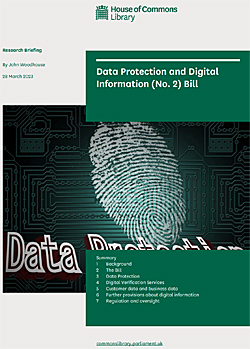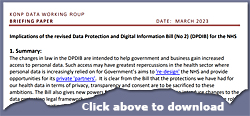 |
|
|
|
The second version of the Data Protection and Digital Information Bill No 2 is now making its way through Parliament, after getting its second reading on 17th April 2023. The main difference between this Bill and its predecessor is that it is even more business friendly, gives the state greater powers to access UK citizen personal data, and makes it more difficult for individuals to find out what information businesses and state bodies are holding on them.
We know already that insurance companies and employers are increasingly asking for personal healthcare data when it comes to claims, and the hiring new workers. Furthermore, the medical insurance industry needs full access to our private healthcare records in order to be able to make profit from such data, and to develope our healthcare system into a privately run concern as in the US! The implication for those who have or are being treated for mental health illnesses, and disabled people seeking employment is obvious; especially when you consider not all disabilities are visible. In effect, this Bill will make it harder for us to ensure that our private data remains just that. In reality all workers who have had or currently have medical intervention and support via NHS services, will no longer be protected from snooping businesses and organisations. The new Bill will intentionally wipe out majority of the EU/UK GDR data protections we currently have. Some of the main concerns abut this Bill are that the Bill will: • Worse still it creates a new duty to promote “economic growth, innovation and competition” rather than the protection of personal data. In effect the Commissioner has the right to considers it is better for economic growth to adopt the US system whereby business can sell on personal data of their customers without notice. • Represent an abuse of democracy through vaguely worded Henry VIII clauses that will give ministers delegated powers to change primary legislation without proper scrutiny by Parliament. This dangerous Bill is not fit for purpose and must be stopped. Existing legislation, such as the UK GDPR and Data Protection Act (2018), although not perfect, already provides the means, where appropriate, for controlled access to confidential data. What is needed is the robust endorsement of existing safeguards, not legislation that reduces protections.
But YOU TOO can be part of the campaign to protect your personal healthcare data, and indeed all your personal data, by opposing this Bill. They have also produced an MPs’ Briefing now available on the KONP website or direct by clicking on the image right; with a template covering letter, again available on their website. According to the House of Commons Library Briefing to MPs, there are many groups raising concerns: The Open Rights Group, an organisation campaigning on surveillance, privacy, and free speech, has claimed that the Bill would, among other things, weaken data subjects’ rights, water down accountability requirements, and reduce the independence of the ICO. Source: KONP / House Of Commons Library
|
|
|


